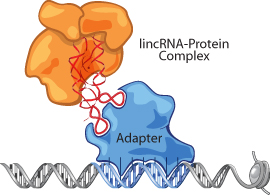Research
RNA, as a molecule, suffers from a serious publicity shortcoming, stemming in part from its 'middle man' status in the central dogma of biology: DNA→RNA→Protein. And yet, for as long as we have been aware of the roles of messenger RNA in the translating the genetic code into proteins, we have known that RNA was capable of so much more. Non-protein coding RNAs have been essential components of numerous core biological processes, including but not limited to ribosome assembly, splicing regulation, and amino acid elongation. It is no wonder then, that as the technology to identify and characterize expressed RNAs becomes increasingly more sensitive and available, that we are able to identify new noncoding RNAs with integral roles in many more biological systems. As we continue to unravel the complex mechanisms of gene regulation, cellular differentiation, and cell fate specification, our understanding of the importance of non-coding RNAs continues to expand.
 Long noncoding RNAs (lncRNAs)
represent a recently-formalized class of RNA molecules with established roles in differentiation, cell fate specification, apoptosis, and various disorders including cancer. As a class, they have remained relatively elusive until recently due to their low expression and conservation levels.
Long noncoding RNAs (lncRNAs)
represent a recently-formalized class of RNA molecules with established roles in differentiation, cell fate specification, apoptosis, and various disorders including cancer. As a class, they have remained relatively elusive until recently due to their low expression and conservation levels.
I am interested in the mechanisms by which non-coding RNAs regulate target gene expression in the context of neuronal differentiation; their coordinate interactions with regulatory protein complexes, and functional roles in establishment and maintenance of the neuronal phenotype. The emergence of RNA-Seq as both a discovery and quantification tool for RNA, has freed research from the previous a priori restrictions of classic tools such as quantitative PCR and microarrays. This new era has allowed for rapid identification of novel RNAs, has served to reshape our reliance on conservation as a tool for functional annotation, and has allowed for faster and more sensitive screening for RNA regulation across multiple phenotypes.

